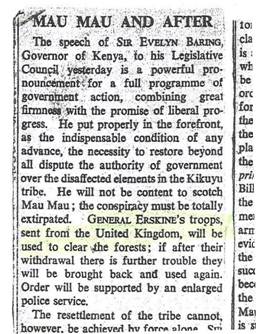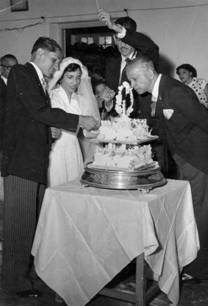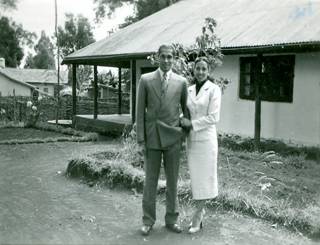The following is based on conversations with Mrs Emma Gama Pinto. All rights reserved. Please leave your comments at carvalho_sel@yahoo.com
Young Emma Dias awaited the arrival of the man from Suswa Road. The meeting had been arranged through her twin sister Joyce, her brother-in-law, Tome, and his brother, Rosario. When he finally arrived, Emma noticed he had a slight stoop and walked with his shoulders bent forward. Perhaps to disguise his nervousness, he began talking about the population statistics of Jamshedpur, Emma’s home town in India. The man in question was Pio Gama Pinto.
 |
Times, Kenya October 21, 1953
|
The year Emma came to Nairobi (1953), Governor Evelyn Baring stood before the Kenya Legislative Council and opened his speech, with these words:“A short time ago, before Emergency, Kenya appeared to be on the way towards prosperous development. How rapid that development was can be seen in the figures of the growth of our national income rising from £53 million in 1947 to about £107 million in 1952”.He spoke of prosperity which unfortunately had not permeated to the African. Instead, it was evidence of the wide abyss that existed between native Africans and White settlers. Kenya was in the grip of a crisis. A growing Kikuyu population had put pressure on land, the most fertile of which was occupied by White settlers, rendering vast sections of Africans landless or as impoverished “squatters”. This resentment found expression in a return to tribal Kikuyu loyalties and gave birth to the Mau Mau insurgency. To the African, Mau Mau was the militant voice of nationalist aspirations. To the White settler it was a vulgar and brutal attack on their way of life. By any account, Emma had landed in Kenya at a perilous time.Emma and Pio began courting. Having done brief stints as a journalist with the Colonial Times and the Daily Chronicle, Pio was now employed by the Indian Congress. He worked diligently in a small room of the Desai Memorial Library, writing articles and petitions, raising awareness of the injustice of the Emergency and money for detainees. He was instrumental in revising the Land Reform Act. The Indian High Commissioner, Apa Pant, gifted Pio with a typewriter and stationery from his office.
One of Pio’s many associates was Makhan Singh, who alongwith Fred Kubai, was engaged in trade union activity. They had tried to register the East African Trade Unions Congress in May of 1949. The Kenya government could not find adequate reason to reject the application but did so nonetheless, because to their mind Makhan Singh “had all the characteristics of a Communist party member”. It was an effective way to diminish people who raised unsettling questions about equality in a segregated country. This label of Communist was one that had stuck to Pio as well, something Emma found to be incompatible with her own ideology. She confronted Pio and told him, she was not interested in being associated with a Communist. Pio appeared at her doorsteps with a box of chocolates and an offer to discuss the issue with a priest.
 |
Emma and Pio's wedding
|
On January 9, 1954, the couple wed at Parklands Catholic Church. It was a large wedding, mostly friends from the groom’s side. Emma’s parents flew in from India. J M Nazareth raised the toast. The next day the groom and a few guests suffered a bout of food poisoning. A seven year old girl succumbed. It was perhaps a sombre foreshadowing of events to unfold.Four months after the wedding, Nairobi was cordoned off by police. Operation Anvil, under General Erskine had commenced; an attempt to “clean-up” the city of “subversives and undesirables”. On the first day of its operation, the Indian Commissioner’s office in the Grogan Road area, became a target. At mid-day a group of British soldiers entered the offices, held staff at gun-point and forced open cabinets with confidential files. Seeing the African staff in the office disperse, they gave chase using filthy language, breaking down doors and claiming loudly that the Indian Commissioner’s office was a Mau Mau office. The African staff, who were nominal employees were all arrested without cause and taken away. Although, the government apologised to the Commissioner the next day claiming it to be a mistake, it was becoming clear the British perceived a sympathetic Indian attitude towards the Mau Mau and that the ever reaching tentacles of Operation Anvil needed little justification in arresting without specific charge. Emma and Pio settled into domesticity, coming to terms with Emma’s lack of culinary skills and Pio’s busy schedule. Pio didn’t want Emma to waste her life at home and encouraged her to work. She landed a job as a junior secretary at International Aeradio Limited (IAL), a British Engineering firm at Nairobi West Airport. Four weeks into her job, she received a call that Pio had been arrested under the broad sweep of Operation Anvil. She rushed to Nairobi prison, where Fitz Remedios Santana de Souza met her. Fitz and his wife Romila would become life-long friends. Pio spent barely ten minutes with her outside the prison reception area, near the gates and assured her that he would be home soon, that it had been a mistake which would get sorted out. Emma didn’t know it then, but it would be the last time she was to see him for nearly four years. Five months into their marriage, Pio was taken from Emma.He was sent to Mombasa’s Fort Jesus prison and then to Takwa Detention camp on Manda Island. Manda is an extremely hot and inhospitable island often without the relief of rain. When the International Red Cross team of Dr Marcel Junod and Dr Jean-Maurice Rubli, visited Takwa in 1959, they found the detention huts were set in the hollows of the dunes, denying detainees the benefit of sea-breeze, making it all the more airless and intolerable. The Kenya government believed Mau Mau was a disease, and camps were justified as a means to “mental” rehabilitation. Detainees were segregated into those who were inclined to rehabilitation, meaning those who co-operated and those branded as “hard-core.” Pio, was considered a “hard-core” and kept away from the main camp population. Beatings were common in camps but more damning were the cramped and unsanitary conditions of filthy latrines and overflowing night-soil buckets that resulted in frequent outbreaks of typhoid, tuberculoses and dysentery. One of Pio’s tasks was to empty night-soil onto the beach. Pellagra and scurvy due to dietary frugalities were also common. Sometimes Pio would find turtle eggs on the beach with which he supplemented his diet. At one point, Pio was assigned chores in the canteen. He smuggled food rations to share with fellow detainees. Years later, when he was released he rarely spoke about his time in detention. He escaped much of the physical brutality meted out to Kenyan inmates but the experience left him traumatised nonetheless. At one point in detention, he seriously considered suicide. Ultimately it was the sufferings of these detainees that pricked the British public conscience and set Kenya on the road to independence.
For the most part, Emma was by herself and would need to muster all her inner reserves to survive. She did not have any contact with Pio. Her written pleas to Governor Baring, went unanswered. It would be almost two years before she was allowed to write to him. For a while, Anton and Ema Gama Pinto, Pio’s parents moved to Nairobi from Nyeri, to be of assistance to Emma. The Gama Pinto ancestry can be traced to Carrem, Porvorim in Goa. Emma continued in her job at IAL and even overcame Kenya’s notorious colour bar which existed in most companies. In her last year at IAL, she found herself to be the only Asian invited to a dinner-party hosted by the Managing Director from London, at a “whites-only” hotel.
 |
Emma and Pio at Kabarnet under Restriction Orders
|
Then in January of 1958, Pio was released from detention and transferred to Kabarnet, to be held under Restriction Orders, a sort of house-arrest under supervision of District Commissioner Butler. Pio was the only inmate in a single-room house. If Pio was to be exiled, Emma decided to join him. She, under police escort, made the 10 hour trek from Nairobi to Kabarnet, a feat which earned her the respect of the District Commissioner and his wife. She stayed with Pio, initially in the small dwelling but later in a two-bedroom house constructed especially for them. Here in misty Kabarnet where Pio and Emma rediscovered each other, their first child Linda, was conceived. After nearly 2 years at Kabarnet, in October 1959, Pio was at last declared a non-threat to security and released just in time for the birth of their second daughter, Malusha.The dawn of 1960 heralded the collapse of the British Empire in Africa. Kenya woke up to independence on December 12, 1963. Pio initially stayed away from the fray of African politics. He was always of the opinion that Africans should have the loudest say in the running of their country. Nonetheless, he concentrated his energies in working behind the scenes, shaping political opinion, fund-raising, assisting ex-detainees and setting up the Lumumba Institute. He renewed his ties with Fred Kubai and set about strengthening the position of trade unions. On a trip to India, to celebrate Goa’s independence, he met with Nehru in New Delhi and convinced him to fund a Swahili newspaper, thus establishing the Sauti Ya Mwafrica. Later at Emma’s insistence, Pio stood for a Parliamentary seat, and was voted in as a Specially Elected member of the House of Representative. Kenya was keen to reciprocate its love. Politics in post-colonial Kenya bore the resemblance of murky sludge. A rift had developed between Jomo Kenyatta, independent Kenya’s first President and a more radical group lead by Vice-President, Oginga Odinga and supported by Pio. Corruption and human greed, which Pio became increasing aware of, had grown insidiously into the system. Perhaps the last furious row between Pio and Kenyatta, at the Legislative building, witnessed from afar by Fitz de Souza, had sealed Pio’s fate.On February 25, 1965, Emma received a call while at work from her mother, to tell her that Pio had been attacked. Shots had rung out into the mid-morning quiet of Nairobi’s Lower Kabete Road. An African man approached Pio, whilst in his car with his daughter, Tereskha; greeting him with “Jambo, Bwana” and a bullet.Emma hurried home, but not before steely presence of mind made her call Oginga Odinga and Joseph Murumbi, the Goan-Kenyan who would become Kenya’s second Vice-President (1965-1966). They arrived together and made their way to the car. Someone had put a blanket over Pio’s bullet-ridden body. A vain attempt to cover Kenya’s quivering collective shame and guilt. Pio had given his life to the Kenya he loved so much, becoming her first martyr. Eleven years into their marriage, Pio was once again taken from Emma.
* * * *
Emma moved to Canada two years later and dedicated her life to single-handedly raising three girls. She currently resides in Ottawa, Canada.

